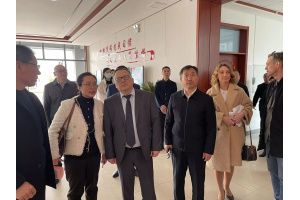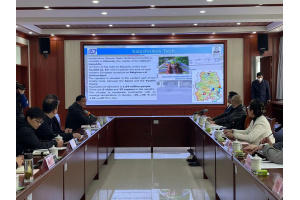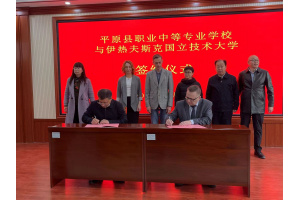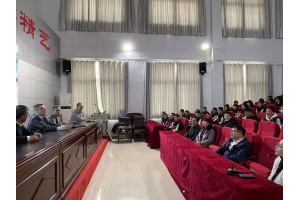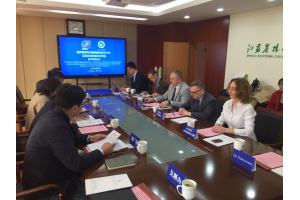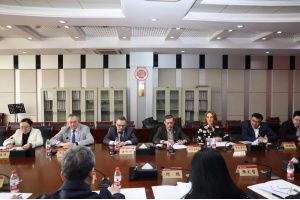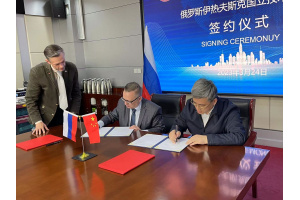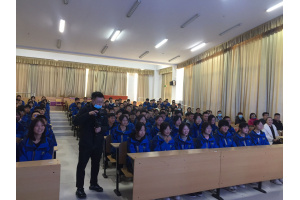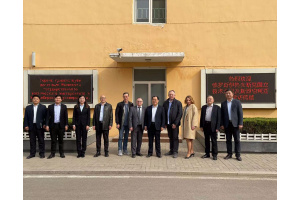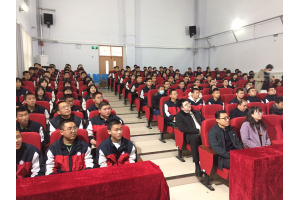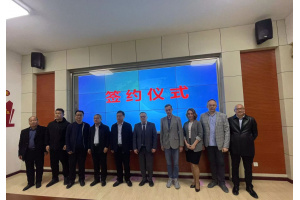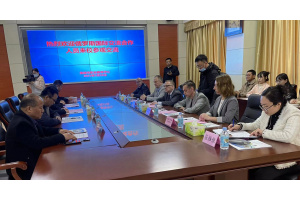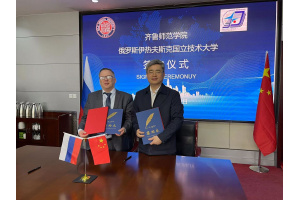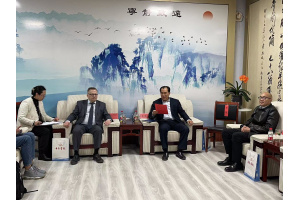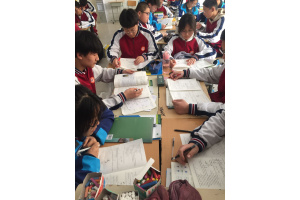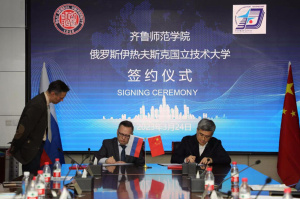Cooperation between Kalashnikov ISTU and Chinese universities: yesterday, today, tomorrow
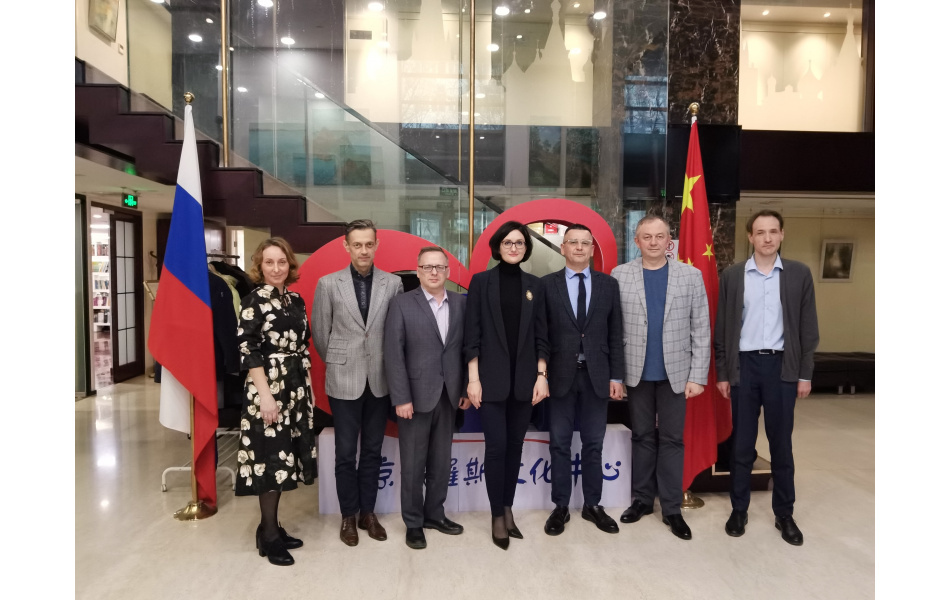
On March 23—28 the delegation of Kalashnikov ISTU headed by Acting Rector Aleksandr Gubert visited People’s Republic of China. It was the first visit of representatives of Russian universities to PRC after the removal of lockdown restrictions in China.
The cooperation of Kalashnikov Izhevsk State Technical University with Chinese research and educational organizations has rather long and fruitful history. In 2011 Kalashnikov ISTU became a member of Association of Sino-Russian Technical Universities, and since 2016 – a member of Association of Universities of Privolzhsky Federal District of the Russian Federation and Provinces of the Upper and Middle Streams of Yangtze River of PRC. In 2022 our university signed 9 new agreements of cooperation with Chinese educational organizations, the Centers of Chinese and Russian Languages were opened at Kalashnikov ISTU and Qilu Normal University (Shandong Province), and in September 2022 Wushu Festival was organized with the support of the Head of the Udmurt Republic Aleksandr Brechalov.
Results of the visit of Kalashnikov ISTU delegation to PRC
The program of the visit of Kalashnikov ISTU delegation to China in March was eventful: meeting with the administration and representatives of Chinese Embassy in Moscow, Russian Embassy and Russian House in Beijing, meetings at 10 educational organizations, including: meetings with students of state and private schools (Yucheng Huaoo high school, Pinyuan vocational college, Center of Professional Education Yucheng), trips to Jinan (capital of Shandong Province), Weihai and Chinkiang (Jiangsu Province), meetings with representatives of Zhishang and Min Yang Education Groups — main assistants of our university in initiating and developing cooperation with Chinese educational organizations.
During the visit of Kalashnikov ISTU delegation, the application for joint study program in mechatronics, prepared together with Weihai Marine Vocational College (WMVC, Shandong Province) with active support of Zhishang Education Group, was submitted to the Ministry of Education of PRC; the results are expected in May.
There are two levels of joint study programs in China implemented together with foreign universities. The first level — a separate program when two universities (Chinese and foreign) together work out and implement a program approved by the Ministry of Education of PRC based on the agreement on the joint study program.
International joint study programs in China can assume different study periods at each partner university («2+2» — two years of studies in China and two years abroad; «3+1» — three years of studies in China and one year abroad, etc.).
The joint study program in mechatronics with WMVC assumes the bachelor’s degree obtained following the scheme «3+1» (three years in China and one year in Russia). During three years of studies in China, one-third of all courses will be taught by teachers of Kalashnikov ISTU (in Russian or English).
The second level of joint study programs is a joint institute. To open a joint institute, partners have to implement at least three joint programs, the total amount of programs implemented at the institute is not limited; the institutes are funded by the Ministry of Education of PRC. Kalashnikov ISTU has worked out and is implementing a road map of establishing a joint institute together with Jiangsu Agricultural and Forest Professional Technical Institute, which will train bachelor students in three study programs — mechatronics, mechanical engineering and computer technologies; the corresponding application will be submitted in October.
Experience in cooperation: opportunities and perspectives
According to the information of Chinese Embassy, in 2019, the last pre-pandemic year, the academic exchanges between PRC and RF amounted to 100,000 students a year. In 2020 the COVID “fall” started, as a result, 41,000 Chinese students are studying in Russia today and 12,000 Russian students — in China. The Chinese side plans to reach the pre-pandemic indices in the nearest future.
At the same time, today China takes the first position in the world in spreading technical education, universities have a powerful material and technical base, the state plays a significant role in financing them, and, in general, the Chinese market looks as one of the most perspective for Russian universities.
Director of the Institute of International Study Programs Alexey Ryabchikov speaks about the interaction with Chinese partners, joint projects and plans:
«Our Chinese colleagues speak publicly and openly about the reasons of their interest in cooperation, and their arguments are very rational.
First of all, in PRC they acknowledge the gap between the west and east, between cities and villages. For example, Shandong University, whose branch in Weihai we visited, is among top-10 universities of China and this is a very high level. And they agree to work with Russian partners under the condition that their study program is among top-10 in RF. At the same time, there are many regional universities of another level in China.
Second, the Chinese Government declared the construction of a new educational model, in which it intends to use foreign (including Russian) teaching techniques and teachers’ experience.
Third, there are peculiarities of the established Chinese educational system with 3-year and 4-year bachelor studies. The 3-year bachelor studies are considered incomplete, the graduate is not awarded the diploma on higher education, and, consequently, he/she does not have any advantages in further employment and does not have any guarantees in receiving a high salary. As a result, a high school graduate and the one who has completed 3-year bachelor studies are practically equal on the labor market. A graduate of 4-year bachelor studies is a full bachelor, can take managerial positions and receive a high salary. However, only 40% of Chinese school graduates (about 6.5 mln people out of 16 mln a year) can count on being enrolled to 4-year bachelor programs, there are no vacancies at home universities for the rest.
At the same time, the long-term birth limitation policy in the country has resulted in the situation that there are 6 adults per one child in the family in China today: parents and four grandparents. Consequently, it is possible to pay for studies of one successor, and an average Chinese family can send the child to study abroad. As a result, Chinese universities, implementing 3-year bachelor programs, seek foreign partners to increase the attractiveness of their study programs, realizing them following the scheme «3+1». This is a powerful tool for them in promoting their programs. For the universities having 4-year bachelor studies but not having their own master programs, a similar tool is joint master programs following the scheme «1+1». And we are also planning to work out such programs in the nearest future together with another our key partner — Qilu Normal University.
We highly appreciate the participation of our Chinese colleagues in joint projects and the mutual understanding reached, we are grateful to the partners from the education groups. We are expecting the representatives of Zhishang Education Group to visit Kalashnikov ISTU in May already, and together with Min Yang Education Group we are working on the familiarization 2-week trip of Chinese schoolchildren and their parents to Russia — Moscow and Izhevsk in the frameworks of the summer school at Kalashnikov ISTU.
And, of course, we have extensive plans for the future, and we hope they will be supported by the Chinese side. Thus, our university has fruitful relations with Consulate General of China in Kazan, which was actively involved in the preparation of our visit. Consul General Mr. Syan Bo, during his visit to the Udmurt Republic in January and meeting with the representatives of our university in Consulate General in February, many times expressed his intention to support and develop cooperation between Kalashnikov ISTU and Chinese universities. And the meeting of our delegation with the First Secretary of Chinese Embassy in RF Ms. Cai Hui and Plenipotentiary Minister, Embassy Counselor on Education Mr. Cao Shihai only confirmed the aspiration of the Chinese side to provide conditions for extending the links in education and science, and language and cultural exchanges.
Our experience in cooperation demonstrates that we have vast opportunities and perspectives for mutually beneficial collaboration — from education to culture and sport, in the sphere of business and tourist links between the Udmurt Republic and China.
The necessary condition for success — examination of the specifics of Chinese educational and cultural space, efforts of both sides to overcome the language barrier, sincere desire to rationally establish relations with Chinese partners taking into account the mentality differences. For example, our Chinese partners are used to careful preparation and long-term planning but not solutions and projects aimed at instant feedback and immediate result».
